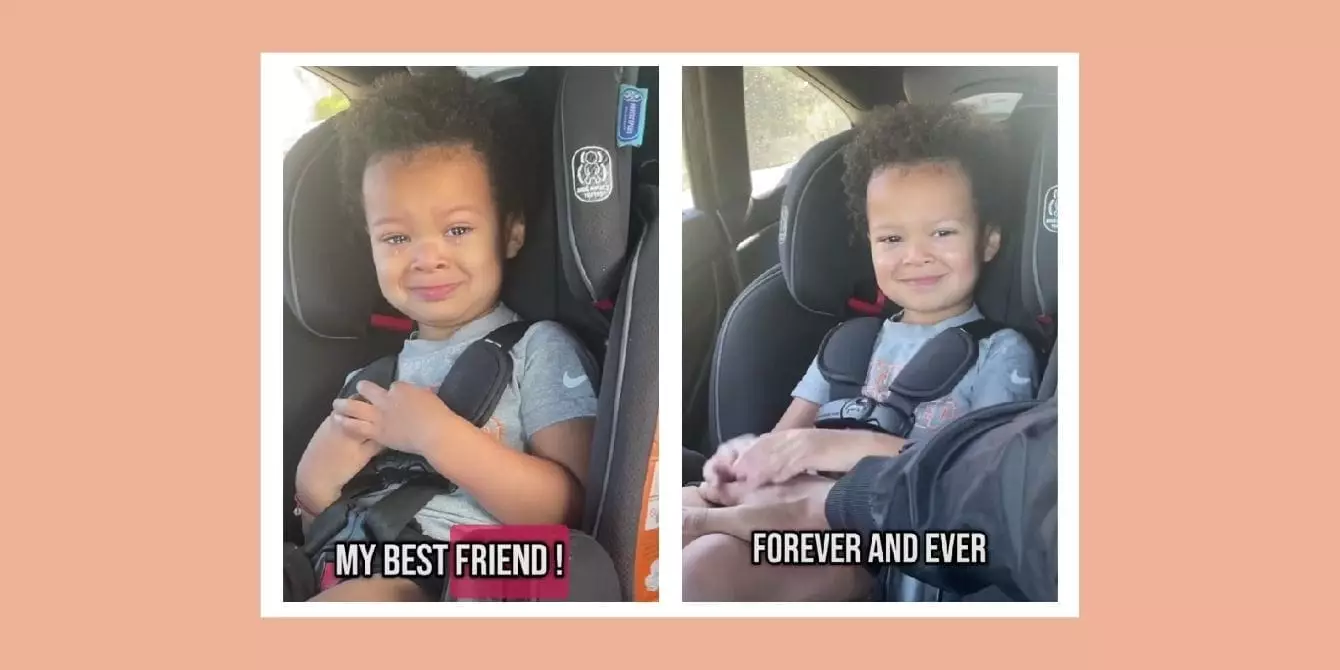Recently, a poignant TikTok from creator @Micahzanesworld has taken the internet by storm, amassing over 4.1 million views. In this emotionally charged moment, a father sits in his car, calmly affirming his toddler son with loving words that resonate deeply. “You’re the best, best son ever, you know that? My favorite! My best friend!” he gently proclaims, instilling an invaluable sense of self-worth in his child. The emotional exchange is palpable—the toddler’s blinked-back tears highlight the significance of their connection, while viewers, too, find themselves caught in the emotional whirlwind. Comments flood in, revealing a universal yearning for such affirmation in a world where emotional vulnerability is often stigmatized, particularly in men.
This video is not simply a cute moment between a father and son; it encapsulates a transformative narrative about fatherhood and emotional expression. In an era where traditional notions of masculinity often dictate emotional stoicism, this father’s approach challenges that paradigmatic framework, showing that tenderness is not a weakness but a strength.
Breaking Generational Cycles
The father’s heartfelt affirmations serve as a powerful counter-narrative to the upbringing many men experienced, characterized by emotional repression. Commenter @Ms. Dee poignantly notes, “In his past life, he wanted to hear that from his dad, and he finally got it.” This observation underscores the impact of generational trauma—how the limitations placed on previous generations can reverberate through the lives of their children. For many fathers, especially those raised in emotionally reserved households, expressing love verbally can feel like a significant shift, almost like rewriting history.
Research underscores this sentiment, revealing that warmth and affection from fathers are critical components of a child’s emotional development. According to findings from the Greater Good Science Center, children who experience emotional warmth tend to enjoy better emotional regulation, higher self-esteem, and enhanced social abilities as they grow. This highlights the responsibility fathers have not only to their sons but also to themselves—to prioritize emotional openness and vulnerability.
Shattering the Tough Guy Image
Spencer, a real estate agent from San Antonio, summarizes the societal trend of viewing masculinity through a lens of toughness. “A lot of times, fathers feel like we need to be super tough on our kids,” he observes, recounting the common parental directives: “Don’t cry. Get up. Be a big boy.” However, he advocates for breaking this cycle, insisting that it is absolutely okay for men to express their emotions. This sigh of relief is a much-needed message in a world that often equates masculinity with emotional detachment.
The response in the TikTok comments section adds a layer of communal validation to this evolving narrative. Comments like, “That little dude is going to grow into a loving, confident, wise man,” and “Teaching him that it’s okay for men to show emotion,” showcase the resonance of this emotional dialogue. In a way, the comments section acts as a cathartic release—a digital therapy circle celebrating the evolution of fatherhood.
The Importance of Intentional Parenting
As we observe such powerful demonstrations of emotional affirmation, we realize the essential nature of this parenting style. It empowers boys to grow into emotionally intelligent men who can love openly, lead with compassion, and allow space for vulnerability when needed. This intentional approach to fatherhood creates a new standard of masculinity that contrasts sharply with previous ideals that often prioritized toughness over tenderness.
Moreover, it sends a strong message: nurturing and affirming love from fathers is not only necessary but vital for the well-being of children. As our culture continues to grapple with the overwhelming expectations placed on mothers to “do it all,” it becomes increasingly clear that shared emotional responsibilities are equally important in parenting.
This father from the viral TikTok, and many like him, is paving the way for a holistic vision of parenthood that embraces emotional authenticity. In doing so, they showcase the indelible power of love—one that transcends the boundaries of traditional gender norms and cultivates a future where expressing emotions is celebrated rather than shunned.

